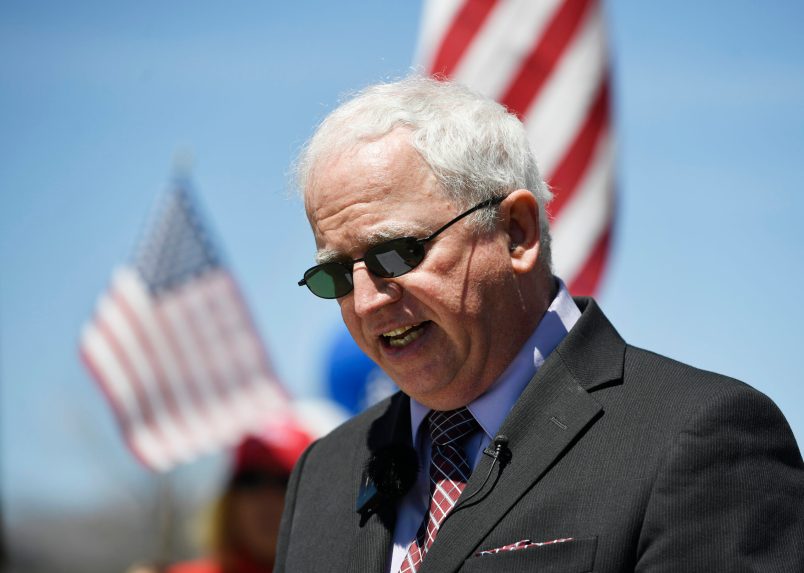The Justice Department on Monday rejected conservative attorney John Eastman’s request that the DOJ return his phone, which FBI agents seized in June.
Eastman asked a federal judge in a filing in June to order the DOJ to return his phone, eliminate records it obtained and to block investigators’ access to it after the FBI seized it. Late last month, federal prosecutors responded to Eastman’s filing, saying that they obtained a second warrant on July 12 to search the contents of his phone, which is in the hands of federal agents with the DOJ’s Office of the Inspector General. Prosecutors said the second warrant included a so-called “filter protocol” to prevent investigators from obtaining potentially privileged information from Eastman’s phone, and that Eastman’s counsel was aware of the protocol.
In a filing on Monday, the DOJ dismissed Eastman’s challenge of the seizure of his phone — which includes Eastman’s claim that FBI agents didn’t show him the search warrant until his phone was seized. The DOJ said that Eastman’s claim lacked legal merit.
“In the movant’s professorial view, he should have been provided a copy of the warrant prior to its execution, and then apparently given time (minutes? hours?) to read and analyze it so that he ‘would have been able to call the officer’s attention to the several constitutional infirmities evident on the face of the warrant, thus preventing the unconstitutional seizure in the first place,’” the DOJ’s filing said.
The DOJ’s filing said that the seizure of Eastman’s phone was warranted because Eastman had a concealed-carry permit at the time, which federal agents learned of before executing the warrant.
“All while agents stood in a parking lot, in an open-carry state, knowing that the movant was authorized to carry a concealed weapon,” Dohrmann wrote.
The DOJ argued that Eastman’s request for his phone to be returned to him and to eliminate all records obtained from it would be a “complete purge of the documents from the Government’s investigatory files” that would “cause substantial detriment to the investigation, as well as seriously impede any grand jury’s use of the seized material in a future charging decision.”
“The law does not support such action,” the DOJ filing said.
The DOJ also pushed back at a previous complaint by Eastman, a private attorney, that the FBI agents who seized his phone appeared to execute a warrant issued on behalf of the DOJ’s Office of the Inspector General, which typically probes wrongdoing by DOJ staffers. But the DOJ said Eastman’s rationale is flawed because the DOJ OIG has authority to “investigate criminal wrongdoing that adversely affects the Department, wherever and among whomever it occurs.”
“As a matter of common sense, he is incorrect: an investigation of wrongdoing by one individual routinely involves obtaining evidence from others, particularly in cases involving conspiracies,” the DOJ filing said.
After saying that Eastman’s “rights and privileges” do not eliminate the government’s authority to seize and search his phone, the filing concluded that Eastman failed to demonstrate “irreparable injury and an inadequate remedy at law sufficient to merit consideration of his attack on the legality of the warrant” or return of records seized from his phone.
Eastman was a key player in former President Trump’s fruitless attempt to subvert the 2020 presidential election results. Eastman unsuccessfully attempted to pressure then-Vice President Mike Pence to overturn the election results. Last March, federal judge found that Eastman and Trump “likely” committed a criminal conspiracy to subvert the election results on Jan. 6.







I would not trust Eastman’s view of “constitutional infirmities.”
Yeah, he’ll be going to jail soon.
Eastman is hardly a “conservative attorney.”
Along with the rest of the MAGAstan Trumpists, his fellow travelers at the Claremont Institute, and most modern Republicans, Eastman is a right-wing extremist.
Don’t insult conservatives by using that label for them.
He knows…
The FBI raided the home of the Orange POS you seditionist delta bravo. Do you think Government gives a frack about his lackeys’.